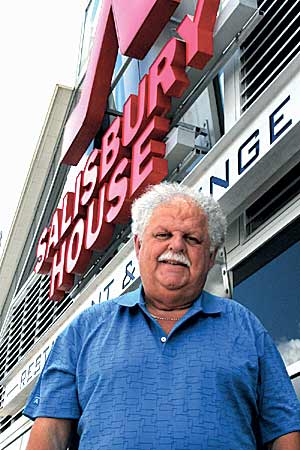

|
V8N15
- July 19-Aug 17, 2010:
There
are people who will say Earl Barish can be hard to work for.
There are others who will suggest he micromanages everything
he touches. Even more say he’s a demanding taskmaster. And yet,
even those who criticize Barish will not even mildly suggest
that he’s a bad guy. In fact, people who might not agree
with everything he does, will always add the following to
everything they say: “Earl Barish is honest, forthright
and has a huge heart. I might not agree with everything, but
I like and respect Earl Barish.” Barish
just happens to be the man who saved a Manitoba icon. And
while he’ll never admit it—and will always credit
others for their efforts—the reality is this: Salisbury
House Restaurants and the Salisbury House brand, would not
exist today if it were not for Earl Joel Barish. There is
no argument. Against all financial odds, he single-handedly
saved a piece of Manitoba history. And at
age 63, he came out of retirement to do it. “Not
only did I start at 63, I thought I knew a lot about business,
but when I got into this I really had no idea,” Barish
said, as he enjoyed breakfast last month at the Sals on the
Provencher Bridge. “This experience was and still is
new to me. This is what I tell seniors groups when I speak
to them. It’s been four years, I’m 67 now, and I
learn something new every day. “No
matter what happens in your life, you never stop learning,
you never stop realizing that you can learn a lot of new and
interesting things. This will always be my message to people:
If you think that you have nothing more to offer society,
think again. This experience has taught me that you can always
learn and you can always contribute.” It just
seems that Earl Barish has always been a success. He is, after
all, the man who made Dickie Dee Ice Cream a staple of summertime
fun right across Western Canada. But contrary
to popular belief he’s not the founder of Dickie Dee.
Fact is, when he was 14-years-old, he drove a Dickie Dee Bicycle
all over East Kildonan and North Kildonan, 11 hours a day
to make the enormous wage of $12 a day back in 1957. “Back
then, Dickie Dee was owned by Sid Glow, magician Brian Glow’s
father,” Barish explained. “In 1957, Frankie Winkler
and I went virtually next door and asked Mr. Glow for a bike.
He had eight Dickie Dee bikes and Frankie and I got one each.
“I
worked 11 hours a day and sold 600 units. That was $60. I
got a 20 per cent commission and I can tell you, as a 14-year-old
in 1957, $12 a day was a helluva lot of money.” Earl’s
father, Jack, was in the cattle business, but by 1958, he
wasn’t doing very well. It was a bad year in the cattle
market and Jack noticed that his youngest son was earning
a lot of money for himself. When Earl suggested to his father
that the family buy the business, his father agreed and did
so. However,
by the time Jack bought the company, things had changed. Earl
had finished high school at 15, started university at 16 and
graduated with a Bachelor of Commerce from the U of M at 19.
For the
next seven years, he worked in the management end of Winnipeg’s
two major department stores, The Bay and Eaton’s. That
story is probably worth a book in itself, but suffice it to
say that by 1970, Jack wanted Earl back in the Ice Cream business.
And Earl took to it like a cat to a ball of yarn. With his
brother Sid, the Barish family turned Dickie Dee into a huge
national success (the subject of yet another book, no doubt),
and by the mid-1990s, Earl had sold the business and was in
a position to enjoy life. He dabbled
as owner of the Winnipeg Cyclone professional basketball team
– if you can call six years of hands-on ownership “dabbling”
– but by 2000, he and wife Cheryl were ready to travel
the world. Sure, he was still determined to invest his money
in what seemed like sound Manitoba businesses, but for the
most part, he was in his late 50s and he was ready to enjoy
life. Still,
in 2001, he bought a share of what appeared to be a thriving
Manitoba operation, Salisbury House, a 70 year old Winnipeg-based
restaurant chain that had been sold to a company in Quebec.
Looking for investors, businessmen Costas Ataliotis and David
Wolinsky, found Earl Barish, who bought 20% of the Salisbury
House brand and became what Earl called, “a silent investor”.
By late 2005, it had become apparent that Salisbury House
was in financial difficulty. “I decided to become a silent
investor in 2001 because I was part of a group that felt it
was bringing Sals back to Manitoba,” Barish said. “But
we got caught in a financial mess.” “In
February 2006, I was in the middle of an extended holiday
with my wife Cheryl when I got a call while I was on the deck
of the pool in Las Vegas. It was Rob McMahon, the receiver
from Ernst & Young. He said, ‘Salisbury House will
go under unless you come back and take over just to keep the
company carrying on?’ I was shocked. Not only was I a
silent investor, but I was getting little or no information
on how the money was being spent. I had no idea it was in
such a mess. “I
had 20 per cent of the company. It fell to me. So after my
astute (he laughs) analysis, I made an emotional decision.
Sals had always been a wonderful company. It was founded in
1931. It was an iconic brand of this province. So I decided
to try and get Salisbury House back on track. I was 63-years-old,
I would have lost $450,000 on the company and while that’s
a lot of money, it would not have affected my lifestyle. I
didn’t have to do it, but I felt it was important. I
watched Eaton’s go down and I couldn’t let that
happen to Sals. So on April 19, 2006, Little
did he know the extent of the mess. The company was $1 million
in debt. It also owed $350,000 in outstanding holiday pay
to its employees. The company had so many debts, newspapers
wouldn’t accept its advertising. And it had no line of
credit. “I
learned quickly what I had to do,” he said. “I needed
to sign a forbearance agreement. We paid a lot of money to
wipe out much of the old debt to the bank, but while our line
of credit was $600,000, it was full. So we had to seek protection
under the bankruptcy act and let me tell you, it was very
difficult to sign that document. We were only allowed to pay
10 cents on the dollar or a minimum Eventually
Barish got through the financial crisis, but not before the
provincial government almost shut down the business and put
600 Manitobans out of work for a measly $51,000 in PST and
outstanding hydro bills (and there is the subject for another
book). Of course,
the financial crisis wasn’t solved without some heartbreak.
He shut down the unprofitable St. Vital restaurant when the
lease came up for renewal. Headingley, a huge restaurant with
a bar (“What were we doing in the bar business?”
Barish asked), had been an 8,000-square foot albatross that
Barish knew he had to close. And the restaurant at Portage
and Carlton was shut down even after Sals was allowed to pay
no rent. “It still wasn’t profitable,” said
Barish. But losing
three restaurants was hardly the end of the world. With the
financial monster tamed, Barish slowly started making Sals
profitable again. He bid successfully for the food service
contracts at three city-owned golf courses – Windsor
Park, Kildonan, and Harbour View. He has outlets at Canwest
Park(Goldeyes) and Canad Inns Stadium (Bombers) and at Seven
Oaks Hospital and Health Science Centre. And this summer the
SalsMobile will debut at the Red River Ex, outside the Bomber
Games and at numerous festivals and celebrations throughout
the province. In October a new Sals location will open at
the new James Richardson Airport. “On
June 1, we bought back three buildings that had been sold
by the previous ownership as part of a major multi-million
dollar purchase.” Barish said proudly. “One of these
locations houses our Commissary which is central to our business.
It is back in good hands.” We also
bought the former Longhorn Steakhouse on Leila Avenue and
a brand new Salisbury House will open on Oct. 1. It will also
include our Head Office at the back of the new restaurant.
And we have plans for a new restaurant at Pembina and Stafford.
The future looks bright.” Not all
business stories in Manitoba have a happy ending, but in the
case of Salisbury House, a senior citizen with a big heart
and a hands-on management style has turned an icon that was
on life-support into a thriving re-birth with perhaps the
brightest prospects in its near-80-year history. “We
were able to take a company in financial distress and turn
it into a vibrant, active, iconic part of the Winnipeg community,”
said Barish. “It’s a restaurant chain that is unique
to Manitoba and it’s positioned where it should be, a
company utilized by two million customers per year. “Sals is a happening now and, yes, you could say I’m proud of that.” (Read
more in the July
19-Aug 17/2010 issue of Senior Scope) |
|
Lost
or Stolen Wallet?
|
||||||||||
| Financial Planning Solutions Having
grandchildren:
|
||||||||||||
|
|
||||||||||||
|
Publisher: Kelly Goodman
Phone: 204-467-9000
Box 1806 Stonewall
Manitoba, Canada
R0C 2Z0
Email: kelly_goodman@shaw.ca

